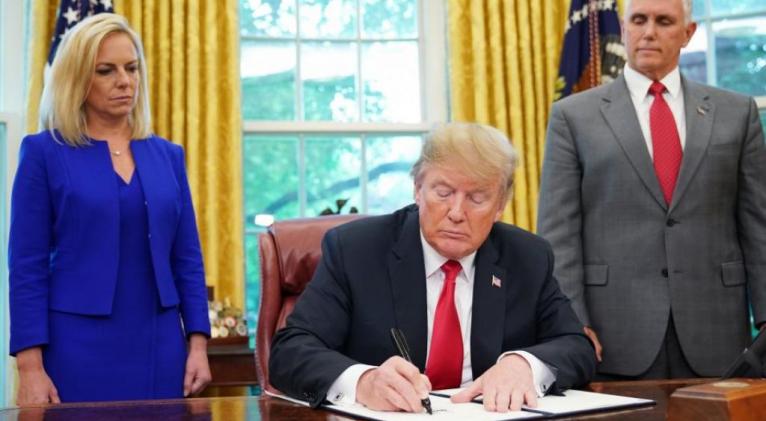Trump Orders End To Family Separations At US-Mexico Border

After global outrage over U.S. President Donald Trump's policy to separate asylum-seeking families at the Mexican border, he signs to end the practice.
U.S. President Donald Trump signed an executive order on Wednesday to end the separation of undocumented migrant parents and children seeking to enter the United States at the Mexico border.
RELATED: US Protests Against Border Separations, How We Got Here
The Trump administration had separated 2,000 families in the past six weeks at the U.S.-Mexico border, holding children as young as four years old in cages within cold warehouses in border states. The warehouses have become known as #Trumpcamps and have been likened to the U.S. Japanese internment camps during WWII.
Social media outlets lit up this week with domestic and international backlash protesting Trump's family separation policy. A June 18 Quinnipiac poll found that U.S. residents opposed the policy 66-27.
Pope Francis and outgoing United Nations High Commissioner for Human Rights Zeid Ra'ad al-Hussein called the administration's actions "unconscionable" and called for an immediate end to the policy. Even the president's wife, Melania, urged her husband to cease and desist.
Earlier this week, Trump and his Director of the Department of Homeland Security (DHS) Kirstjen Nielsen tried to blame the practice on Democrats and some unnamed law they claimed the party had passed.
By the time of the signing, Trump publicly delivered a different message: "It's about keeping families together while at the same time making sure that we have a very powerful, very strong border," he said, signing the order in a hastily arranged Oval Office gathering that many in his closest circle were unaware was happening until it was over.
"I didn't like the sight or the feeling of families being separated," said the president, flanked by Homeland Security Secretary Nielsen and Vice President Mike Pence. "I think anybody with a heart would feel strongly about it. We don't like to see families separated."
Trump also took the opportunity to reiterate his zero-tolerance policy: "We are keeping a very powerful border and it continues to be zero tolerance. We have zero tolerance for people that enter our country illegally."
His somber tone on Wednesday was a far cry from his tweets on Monday, in which he criticized Germany and Europe for immigration policies he claimed had "violently changed their culture."
"Big mistake made all over Europe in allowing millions of people in who have so strongly and violently changed their culture!" tweeted Trump.
The vast majority of separated families were Central Americans trying to gain political asylum, to which they are entitled under international law.
The U.S. border patrol took up the practice of "preventing refugees from coming to ports of entry, turning them away... and making them wait for indeterminate periods of time in Mexico," Jeremy Slack, assistant professor of geography in the Department of Sociology and Anthropology at the University of Texas in El Paso, told teleSUR.
Last month, U.S. Customs and Border Protection officials told the media they couldn't receive any more asylum seekers "until space becomes available."
Such families were forced to enter 'illegally' at non-port entries, where they were then picked up by border patrol agents and adults put on the path to be tried for misdemeanors or felonies. This obliged authorities to place children in the custody of the Office of Refugee Resettlement. Prior administrations and even Trump had previously treated these cases administratively, which allowed families to stay together.
The order requires that immigrant families be detained together after entering the country. However, several Republican members of the House of Representatives – briefed by Homeland Security Secretary Nielsen on Wednesday about the president's decree – said they "do not know if it would prevent family separations during detentions longer than 20 days," Reuters reports.
The Families Belong Together organization is planning a national-level U.S. protest against the president's immigration policy on June 30.













Add new comment